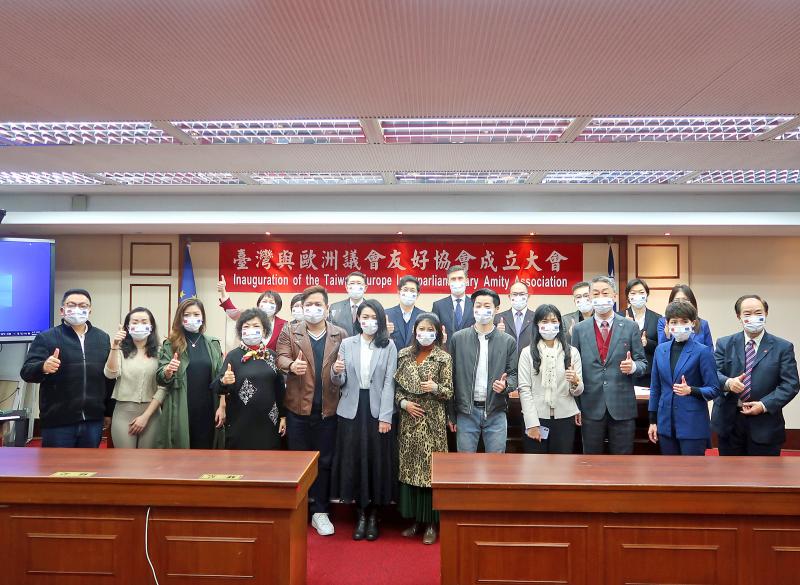The Taiwan-Europe Interparliamentary Amity Association was inaugurated yesterday, with legislators praising strides made toward closer relations and an invitation for the association chair to visit the European Parliament once the COVID-19 pandemic subsides.
Dozens of officials and lawmakers attended the event online and in person at the legislature in Taipei.
In an address, Democratic Progressive Party Legislator Tsai Shih-ying (蔡適應), who since 2016 has served as chairman of the Taiwan-Europe Parliamentary Friendship Association and in 2019 led a delegation to Europe, celebrated the “leaps and bounds” Taiwan-Europe relations have taken and their promising trajectory.

Photo: Lu Yi-hsuan, Taipei Times
Although many events have been canceled over the past two years due to the pandemic, Taiwan and Europe have still supported each other through donations of masks and vaccines, Tsai said.
The G7 in June last year declared the importance of stability in the Taiwan Strait, followed by a European Parliament resolution in October calling for closer political relations and cooperation, and the first formal visit to Taiwan by European lawmakers in November, he said.
Taiwan and Europe share the common values of democracy, freedom, human rights and the rule of law, Tsai said, expressing the hope that relations would continue to be enhanced across more areas.
European Parliament-Taiwan Friendship Group chairman Michael Gahler in a prerecorded address offered his congratulations and extended an invitation to Tsai to visit the European Parliament when the pandemic eases or to meet in Taiwan.
Group vice chairman Andrey Kovatchev touted the past year’s achievements as a solid foundation for further development, while vowing to keep pushing for a bilateral investment agreement.
Group vice chairman Juan Fernando Lopez Aguilar said that Taiwan has many friends in Europe who support the nation’s meaningful international participation, and respect its liberal and democratic values.
Group members would therefore continue to call on the EU, Japan, India, New Zealand, Australia and others to stand together in opposition against Chinese aggression toward Taiwan, he said.
At the legislature, European Economic and Trade Office in Taiwan Director Filip Grzegorzewski attested to Taiwan’s importance as a trusted partner in the Indo-Pacific region with shared values and goals.
Taiwan and Europe enjoy friendly relations with cooperation in a variety of areas, including human rights, trade, digital innovation, renewable energy, labor and disaster preparedness, Grzegorzewski said.

MAKING WAVES: China’s maritime militia could become a nontraditional threat in war, clogging up shipping lanes to prevent US or Japanese intervention, a report said About 1,900 Chinese ships flying flags of convenience and fishing vessels that participated in China’s military exercises around Taiwan last month and in January have been listed for monitoring, Coast Guard Administration (CGA) Deputy Director-General Hsieh Ching-chin (謝慶欽) said yesterday. Following amendments to the Commercial Port Act (商港法) and the Law of Ships (船舶法) last month, the CGA can designate possible berthing areas or deny ports of call for vessels suspected of loitering around areas where undersea cables can be accessed, Oceans Affairs Council Minister Kuan Bi-ling (管碧玲) said. The list of suspected ships, originally 300, had risen to about 1,900 as

DAREDEVIL: Honnold said it had always been a dream of his to climb Taipei 101, while a Netflix producer said the skyscraper was ‘a real icon of this country’ US climber Alex Honnold yesterday took on Taiwan’s tallest building, becoming the first person to scale Taipei 101 without a rope, harness or safety net. Hundreds of spectators gathered at the base of the 101-story skyscraper to watch Honnold, 40, embark on his daredevil feat, which was also broadcast live on Netflix. Dressed in a red T-shirt and yellow custom-made climbing shoes, Honnold swiftly moved up the southeast face of the glass and steel building. At one point, he stepped onto a platform midway up to wave down at fans and onlookers who were taking photos. People watching from inside

Japan’s strategic alliance with the US would collapse if Tokyo were to turn away from a conflict in Taiwan, Japanese Prime Minister Sanae Takaichi said yesterday, but distanced herself from previous comments that suggested a possible military response in such an event. Takaichi expressed her latest views on a nationally broadcast TV program late on Monday, where an opposition party leader criticized her for igniting tensions with China with the earlier remarks. Ties between Japan and China have sunk to the worst level in years after Takaichi said in November that a hypothetical Chinese attack on Taiwan could bring about a Japanese

The WHO ignored early COVID-19 warnings from Taiwan, US Deputy Secretary of Health and Human Services Jim O’Neill said on Friday, as part of justification for Washington withdrawing from the global health body. US Secretary of State Marco Rubio on Thursday said that the US was pulling out of the UN agency, as it failed to fulfill its responsibilities during the COVID-19 pandemic. The WHO “ignored early COVID warnings from Taiwan in 2019 by pretending Taiwan did not exist, O’Neill wrote on X on Friday, Taiwan time. “It ignored rigorous science and promoted lockdowns.” The US will “continue international coordination on infectious